In the midst of this brutal cold we’ve been experiencing the last few weeks, a sunny spring-like day popped up. All the kids were out in all the playgrounds and it was delightful weather and I was reminded of a Ray Bradbury story, All Summer in a Day: the clouds on Venus part once every ten years and all the kids go outside for a few hours. I then wondered if anyone still reads Bradbury.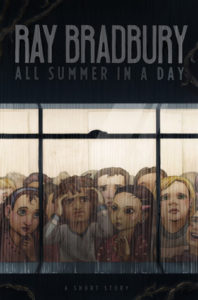
Do they? Or is he another one of those authors everybody knows but doesn’t read, like Heinlein and Asimov; you know, a nod of respect to the founding fathers of science fiction, but there’s newer and, admittedly, better writers out there like Daniel Suarez, Alastair Reynolds and such? We know the importance of George Washington, but only academics read his Inaugural Address.
And I guess that is the way of things and something I must also admit to: I do not read the classics anymore, or, more accurately, re-read them, because been there and done that and there is so much else unread. I’m in the middle of Dan Simmons’ The Terror right now, and then I’ve got to finish Suarez’ books and then Ann Leckie’s Ancillary Trilogy
and then I’ve got to finish Suarez’ books and then Ann Leckie’s Ancillary Trilogy 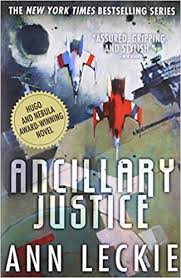
and I subscribe to Clarkesworld and then there’s my own writing and there you go. I think the last classic I re-read was The Moon is a Harsh Mistress, 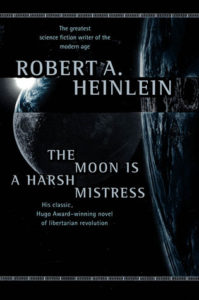
and only because I found a copy and bought it for my son…uh huh, yeah, read it before giving it to him. It’s not like I took a bite out of his hamburger, ya know. Don’t look at me like that.
But I make an exception for Bradbury. Whenever I find his books in some used bookstore or a Goodwill, whatnot, I buy it and read it, the last one being The Illustrated Man.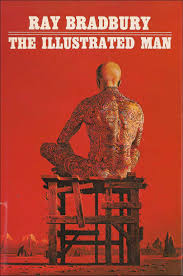
I’ve got an eye out for The October Country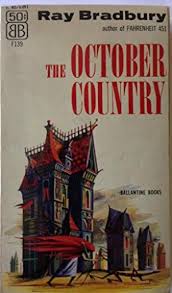 and Something Wicked This Way Comes.
and Something Wicked This Way Comes.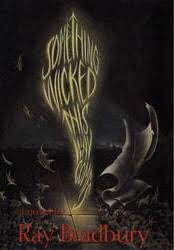
Not reprints, mind you, or at least not recent ones. It has to have the same cover from back when I first read it in the 60s or 70s and yes, yes, I know, I could order from Abe Books but that’s cheating; it’s far more satisfying to stumble across it the same way I first stumbled across Bradbury in the Ft. Rucker, Alabama library, when I was about 12 or 13. He quickly became my favorite author growing up, and running through one of his collections is the quickest way I now have to evoke the feel and the sense of possibility of those years. He quickly became my biggest influence, too. I try to copy his lyrical style…with little success, I must admit, although I write the same long and winding sentences that careen from one subject to another. I don’t have his poetry, though.
The first Bradbury I read was The Martian Chronicles.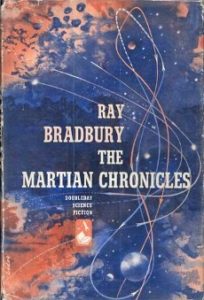
I used to spend quite a bit of time in the library picking up Alan Nourse and Sheila Moon and Have Space Suit, Will Travel 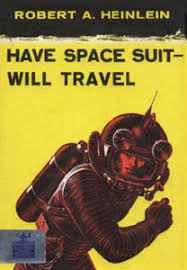
and what’s this? A novel set on Mars? Cool! So I checked it out, not realizing it was actually an anthology of short stories with a Martian theme. Didn’t care, because the writing was magical and echoed that wistful sense of wonder which was (or should be) the background music of growing up.
After that, I picked up anything of his I could find. Fahrenheit 451,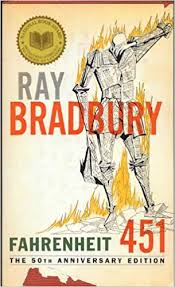
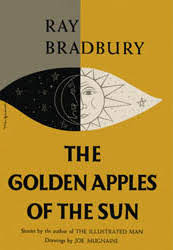
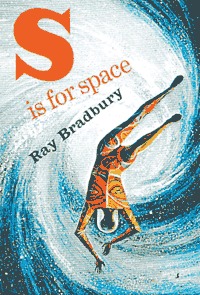 The Golden Apples of the Sun, S is for Space…all science fiction, but not hard scifi. Literary scifi, I guess would be the best description because Bradbury played loose and fast with the rules of science, like the clouds on Venus, which can actually strip you down to a skeleton in about five seconds flat. But getting all the hard science exactly right wasn’t the point. It was more important to capture a mood, such as the one in R is for Rocket,
The Golden Apples of the Sun, S is for Space…all science fiction, but not hard scifi. Literary scifi, I guess would be the best description because Bradbury played loose and fast with the rules of science, like the clouds on Venus, which can actually strip you down to a skeleton in about five seconds flat. But getting all the hard science exactly right wasn’t the point. It was more important to capture a mood, such as the one in R is for Rocket, 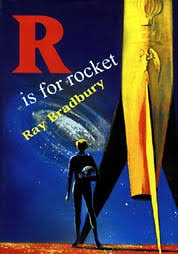
which imbued the sense of excitement that we NASA geeks had back then. We watched the space program go from Mercury to Gemini and then, and then…that fabulous July night of the moon landing. And while the world Bradbury described in R was actually dystopian, it was a world that looked forward, like I did, to mankind’s ventures into space.
It was his horror writings, though, that affected me the most. Before I read The October Country, horror was all about ghosts and ghouls and bad guys getting their comeuppance like in some EC comic.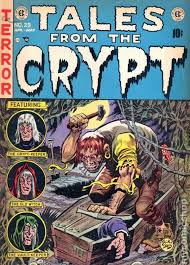
But Bradbury showed the horror that could exist in the everyday, such as a pedestrian out for a nightly stroll,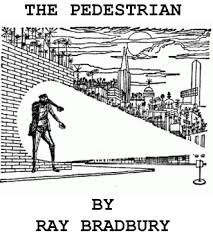 and that horror is best conveyed simply, without slashings and over-the-top scares. One of the most frightening last lines I’ve ever read is from a story of his called The Whole Town’s Sleeping in Dandelion Wine
and that horror is best conveyed simply, without slashings and over-the-top scares. One of the most frightening last lines I’ve ever read is from a story of his called The Whole Town’s Sleeping in Dandelion Wine
(which is not even a horror or scifi collection): “Behind her, in the living room, someone cleared his throat.”
Scared the bejesus out of me.
As did the Eliot family in The Homecoming,
as did the novel Something Wicked This Way Comes, although I did find the ending rather corny. Bradbury wrote poetry of fear; the things that scare us could be a lyric.
One day I’ll write like that.
